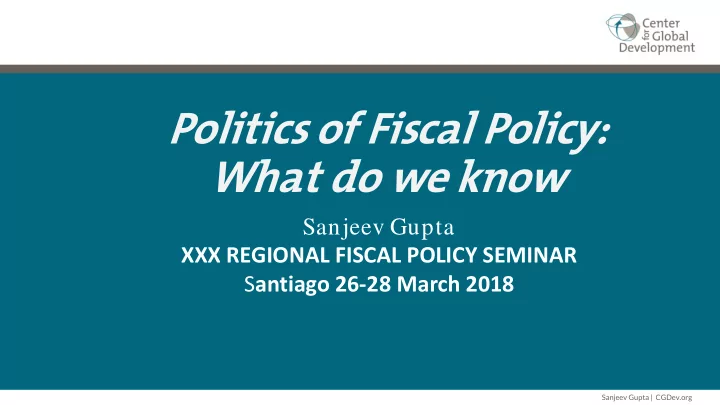

Politics of Fiscal Policy: What do we know Sanjeev Gupta XXX REGIONAL FISCAL POLICY SEMINAR S antiago 26-28 March 2018 Sanjeev Gupta | CGDev.org
Drawn From a Recent Book Published by the IMF Last Year Sanjeev Gupta | CGDev.org | 1
Outline I. Why Focus on Political Economy of Fiscal Policy II. Nexus Between Politics and Fiscal Policy: Elections, Divisions and Ideology III. Fiscal Rules and Fiscal Institutions IV.Supranational Fiscal Politics V. Main Policy Messages Sanjeev Gupta | CGDev.org | 2
I. Rationale • Economics and politics are co-determined, especially with regard to fiscal policy. • The government’s three core functions are inherently political in nature: • Allocation • Stabilization • Redistribution Sanjeev Gupta | CGDev.org | 3
I. Rationale • What is different in the results? • Unlike previous studies which focused mainly on advanced economies, the sample also contains emerging and developing countries • The results go beyond electoral politics and use various electoral calendar variables, measures of political fragmentation, and indicators of ideological polarization to explain how political factors affect fiscal outcomes • The results further look at the role that fiscal institutions can play in bringing fiscal outcomes closer to their optimum Sanjeev Gupta | CGDev.org | 4
II. Politics and Fiscal Policy Fiscal Outcomes Political Factors • Elections • Political Divisions • Ideology Sanjeev Gupta | CGDev.org | 5
II. Impact of Elections On fiscal deficits : up to 1% of GDP higher deficits during election years, with pressure coming from the wage side, particularly in emerging and developing countries On budget’s composition : growth rate of public consumption grows and that of public investment declines as elections approach (Rogoff, 1990) Sanjeev Gupta | CGDev.org | 6 Source: Gupta and others (2016)
II. Impact of Elections On budget’s composition : public wages grow before elections Sanjeev Gupta | CGDev.org | 7 Source: Own elaboration (Data: Fiscal Politics, Chapter 6)
II. Impact of Elections The second way spending composition is affected by electoral investment cycles : the growth rate of public investment peaks about 28 months before elections. Months to elections Source: Fiscal Politics, Chapter 5 Sanjeev Gupta | CGDev.org | 8
II. Impact of Elections Electoral investment cycles (cont’d) : Institutions and governance matter Growth rate of public investment Growth rate of public investment Sanjeev Gupta | CGDev.org | 9 Source: Gupta, Liu and Mulas-Granados (2016)
II. Impact of Elections The tax side also affected as probability of tax reform in Latin America declines as elections approach Sanjeev Gupta | CGDev.org | 10
II. Impact of Political Divisions Political divisions are associated with large deviations between promised adjustment in fiscal deficit and actual outcome. Sanjeev Gupta | CGDev.org | 11 Source: Fiscal Politics, Chapter 2
II. Impact of Political Divisions Weaker majorities are associated with larger debt accumulation in AEs and with smaller debt reduction in EME/LIDCs, during the electoral cycle. AE EME/LIDC Percent of GDP Sanjeev Gupta | CGDev.org | 12 Source: Fiscal Politics, Chapter 9
II. Impact of Political Divisions Big cabinets (with many ministers) accumulate much more public debt than small cabinets Percent of GDP Sanjeev Gupta | CGDev.org | 13 Source: Fiscal Politics, Chapter 9
II. Impact of Ideology Right wing governments are more likely to increase the VAT rates during crises, while left governments prefer to IDEOLOGY AND TAXES: increase top-personal income taxes. Sanjeev Gupta | CGDev.org | 14
II. Finally the Impact of Ideology Left-wing governments are IDEOLOGY AND SPENDING: associated with larger public investment booms Source: Gupta and others (2015) Now or Later? The Political Economy of Public Investment in Democracies, IMF Working Paper No.15/175 Sanjeev Gupta | CGDev.org | 15
III. Can Fiscal Rules and Institutions be Helpful? FISCAL RULES help reduce the electoral fiscal cycle Government Size and Spending Volatility Sanjeev Gupta | CGDev.org | 16 Source: Fiscal Politics (Chapter 12)
III. Can Fiscal Rules and Institutions be Helpful? FISCAL COUNCILS can improve fiscal performance Sanjeev Gupta | CGDev.org | 17 Source: Fiscal Politics (Chapter 14)
IV. Supranational Fiscal Politics Euro Area: Share of Non-Compliers • Supranational rules: (1999=2015, EA-19) effective when owned by country authorities • Lack of ownership explains weak compliance in Euro Area Sanjeev Gupta | CGDev.org | 18 Source: Fiscal Politics (Chapter 18)
IV. Supranational Fiscal Politics IMF programs have shown a high degree of ownership reflecting a growing reliance on IMF TA. Countries with a program conditionality in the revenue area were successful in increasing public revenues Sanjeev Gupta | CGDev.org | 19 Source: Fiscal Politics, Chapter 19
V. Policy Messages • Politics has a decisive influence on fiscal policy formulation and performance • The impact of elections and political divisions is particularly significant • It seems that ideology has less of an impact • Budget institutions help soften the effect of politics on fiscal policy • External constraints work if owned by country authorities Sanjeev Gupta | CGDev.org | 20
Recommend
More recommend